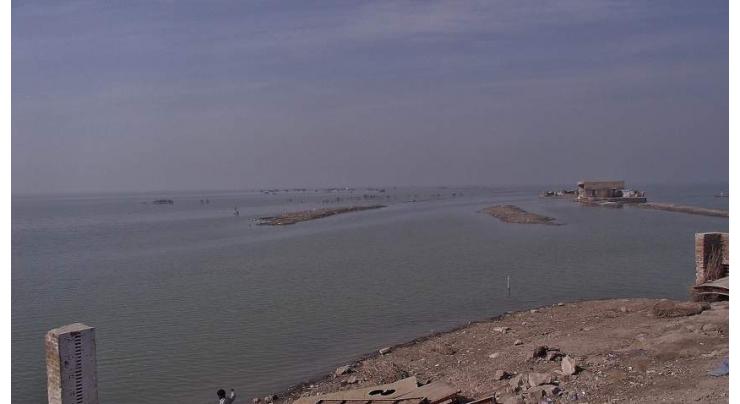
Experts Suggest Nature Based Solutions To Restore Manchar Lake
Mohammad Ali (@ChaudhryMAli88) Published March 22, 2018 | 10:29 PM

The nature based innovative solutions can help address the problems of Pakistan's largest freshwater lake, the Manchar Lake, where massive discharge of contaminated water has polluted the lake.
HYDERABAD, (UrduPoint / Pakistan Point News - 22nd Mar, 2018 ) :The nature based innovative solutions can help address the problems of Pakistan's largest freshwater lake, the Manchar Lake, where massive discharge of contaminated water has polluted the lake.
The suggestion was shared at a seminar organized by WWF-Pakistan, Friends of Indus Forum (FIF) and Centre for Environment and Development (CEAD) at a hall of Sindhi Language Authority to mark the world water day.The event's aim was to bring together the stakeholders from different backgrounds to discuss issues related to the lake and to provide practical solutions for its restoration.The speakers stressed that for maintaining healthy ecological balance, a regular supply of freshwater from the River Indus and other sources should be maintained to Manchar.
They urged that a detailed and multi-sectoral survey of the area focusing on the ecological aspects of restoration should be conducted to assess the problems affecting the area and its residents.
The results of that survey should be used to establish priority actions to rehabilitate the lake and revitalize its benefits for the resident communities.As an outcome of the seminar, a consultative forum was proposed to develop an expert working group comprised of relevant stakeholders who could support development of an integrated conservation and management plan for Manchar.Prof Dr Sarfraz Solangi, Pro Vice Chancellor of Sindh University Thatta Campus shared that the lake had a glorious past and rich biodiversity.He said the academia could play a vital role in restoration and management of the freshwater ecosystems such as Manchar.
Prof Solangi was of the view that the communities dwelling in Manchar and Indus Delta were adversely affected by water-borne diseases.He stressed that serious efforts should be taken to improve the ecology of the lake and socio-economic conditions of the lake's dependent communities.
Dr Babar Khan, Regional Head Wildlife of WWF-Pakistan informed that globally the freshwater resources were depleting fast and Pakistan was no exception.
He further shared that Sindh and Balochistan were facing acute water shortage alongside serious water quality deterioration issues.
He called for nature based innovative solutions to halt and eventually reverse the degradation of ecosystem of the lakes.Nasir Ali Panhwar of Friends of Indus Forum said that the lake was once a rich source of fisheries and provided livelihood to more than 10,000 households of fisher folk living on 2,000 residential boats."The lake could have also contributed a lot in boosting up eco-tourism industry if its beautification is properly maintained," he said.
Dr Uzma Imran, Assistant Professor US-Pakistan Center for Advanced Studies in Water shared findings of her research.According to her, Manchar lake had become highly polluted because Main Nara Valley (MNV) drain carried thousands of cusecs of saline water to the lake.
She told that her study also included a socio-economic survey of the lake and that the study confirmed a significant decline in the earning of fishing communities and prevalence of water-borne diseases.
"The communities are migrating to other areas from Manchar in search of better livelihoods," she told. Mustafa Mirani, a resident of the lake, said the sources of freshwater for the lake could be rehabilitated.
He stressed on the need of supplying water for Manchar from Indus River and demanded that the government should sanction allocation from the river to the lake.He deplored that despite the lapse of many years the Right Bank Outfall Drain (RBOD) project could not be completed so that MNV drain's saline water could be channeled to the sea.Technical Adviser Fisheries Muhammad Moazzam Khan, Sindh University's Dr Yar Muhammad Khuhawar, Sindh Irrigation Department's Sajid Ali Bhutto, Sindh Fisheries Department's Pervez Khawar and others also spoke.
Related Topics
Recent Stories

Iranian President arrives in Lahore today

Currency Rate In Pakistan - Dollar, Euro, Pound, Riyal Rates On 23 April 2024

Today Gold Rate in Pakistan 23 April 2024

Islam enlightened world with its teachings about knowledge: Dr Jamileh

Record London close as oil prices drop on easing Middle East fears

TV tower in Kharkiv struck as Russia captured village

LCCI language courses from May 1

Governor for service oriented governance in Punjab

Survivors tell of panic at C.Africa river boat disaster

Enrolment campaign, awareness walk held in Lower Chitral

“Say no to plastic- yes to tress” campaign kicks off in Attock

'PML-N secures people's trust in by-polls'
More Stories From Pakistan
-
Martyred of 1930 Qissa Khwani massacre remembered
4 minutes ago -
Free meal program starts in govt ICT schools
14 minutes ago -

Iranian President arrives in Lahore today
20 minutes ago -
JKDFP urges world to facilitate Kashmir settlement to end cycle of rights' violations in IIOJK
24 minutes ago -
Delay in tax cases: PM directs to suspend Chief Commissioner Inland Revenue, officials
24 minutes ago -
PFA disposes of 1500 adulterated milk
34 minutes ago
-
KP opposition moves court against approval of budget by cabinet
43 minutes ago -
APWA to offer driving, IT, beauty salon courses in summer
43 minutes ago -
Forest dept's officer, guard terminated for illegal wheat cultivation
43 minutes ago -
‘We will reclaim Article 370 with interest’, vows Mehbooba Mufti
44 minutes ago -
PHC disposes of Ali Amin's writ petition in alleged rigging case
54 minutes ago -
Iranian President Raisi reaches Lahore
2 hours ago
